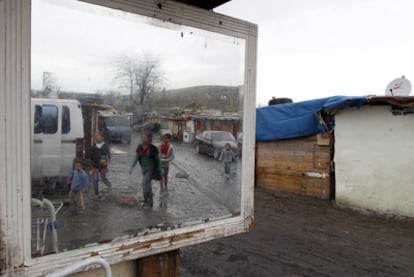Gypsies fly the 'Chicken Roost'
Police pressure is seeing families flee the Cañada Real Galiana shantytown in Madrid
A ghetto within a ghetto, El Gallinero, or the Chicken Roost, has been home to around 100 Romanian Gypsy families since they moved to the Cañada Real Galiana shantytown on the eastern edge of Madrid in 2007.
Conditions for the other 45,000 inhabitants of Cañada Real are grim, but in the hierarchy of misery in the EU's largest slum of this kind, located just 15 minutes from the center of the capital, the Romanian Gypsies have always been at the very bottom of the pile. Living on less than 100 euros a month in ramshackle huts without electricity or running water, some families had resorted to stealing copper wire and selling it at rock-bottom prices. A byproduct of this activity was a huge amount of plastic casing, which had been stripped from the wiring and left in piles around the slum.
The families that have left were linked to men arrested for stealing copper
"They are putting pressure on them so that they will leave," says a volunteer
In late November, the Civil Guard put a stop to the illicit trade, raiding El Gallinero and arresting 37 men, 25 of whom are being held, accused of violent robbery. Since then, a growing number of families has begun to drift away, with at least a quarter of them abandoning their makeshift homes already, according to Church groups and other outreach volunteers who work in the area.
The remaining families say that they are likely to follow suit, accusing the police of a systematic policy of harassment, or because they have been issued with expulsion orders or face arrest.
They add that the families that have left were linked to the men arrested for stealing copper and other metals such as aluminum.
The Civil Guard says that those remaining lack the means to leave, adding that they are not linked to the trade in stolen metals, and, as EU citizens, are entitled to be in Spain. They continue to scratch a living by begging in the center of Madrid, or by working for the Spanish Gypsies living in other areas of Cañada Real.
The remaining residents say that the uniformed officers of the National Police are making life hard for them, and seem determined to clear the area. They say that officers make regular late-night visits to demand to see papers, that they even throw stones at the huts, and have damaged cars in a bid to force the Romanians to move on. A spokesman for the National Police said that they have the area under surveillance, and routinely visit houses to ask for documentation, but denied any abuse of residents.
"They are putting pressure on them so that they will leave," said Jorge Fernández, a volunteer based at the nearby parish church of Santo Domingo de la Calzada. Javier Baeza, of the San Carlos Borromeo, also close by, said that some residents have formally complained to the authorities, accusing police officers of entering houses without a search warrant and of abuse.
Daniel Vasili, a resident of El Gallinero, who is 27 and has a family of six, said that he wants to leave. "I am tired of seeing my children cry every time the police appear." Oprisan Stan, aged 28, with two children, accuses the police of throwing stones at his house.
But poverty is the driving factor behind the decision of so many families to leave. The economic crisis has hit them hard, drying up the little building work that used to be available. Unable to find work, the men sit around El Gallinero, while their wives cook in the doorway to the house and rats scurry among the refuse and debris that litters the area.
Nobody knows where the families have gone and the remaining inhabitants say that while they too will follow, they do not know where to go either. Following the decision of the Sarkozy government to target Romanian Gypsies, expelling hundreds of them this summer, few in El Gallinero say that they will be headed to France. Neither will they be headed home either: "Romania is much colder and much poorer even than here," said one resident.
As for the rest of the Cañada Real, which runs for around 20 kilometers along an ancient sheep-droving route, regional and local governments have repeatedly pledged to clear it over the last 30 years. But still it remains, and in the process has become Europe's largest drugs supermarket.

Tu suscripción se está usando en otro dispositivo
¿Quieres añadir otro usuario a tu suscripción?
Si continúas leyendo en este dispositivo, no se podrá leer en el otro.
FlechaTu suscripción se está usando en otro dispositivo y solo puedes acceder a EL PAÍS desde un dispositivo a la vez.
Si quieres compartir tu cuenta, cambia tu suscripción a la modalidad Premium, así podrás añadir otro usuario. Cada uno accederá con su propia cuenta de email, lo que os permitirá personalizar vuestra experiencia en EL PAÍS.
¿Tienes una suscripción de empresa? Accede aquí para contratar más cuentas.
En el caso de no saber quién está usando tu cuenta, te recomendamos cambiar tu contraseña aquí.
Si decides continuar compartiendo tu cuenta, este mensaje se mostrará en tu dispositivo y en el de la otra persona que está usando tu cuenta de forma indefinida, afectando a tu experiencia de lectura. Puedes consultar aquí los términos y condiciones de la suscripción digital.








































